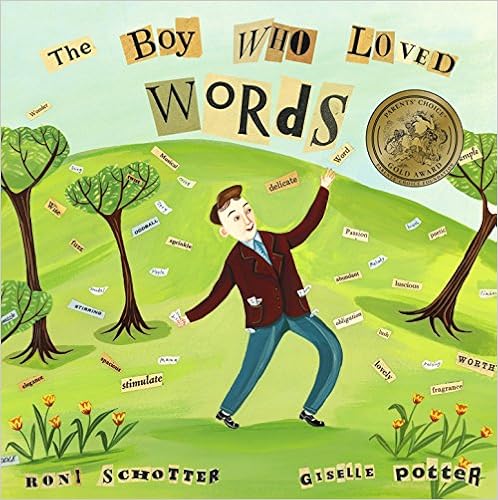
My favorite word is "moot". It fulfills all the necessary requirements of a favorite word. It is fun to say. It is fun to slip into a conversation. And when you pair it with the word "point" (as in "moot point") it becomes doubly amusing. I tell you all this because as much as I love my word, I never thought that I had collected it. I remembered it, sure, but collected? Who collects words? How would that even work? The answer comes in the form of Roni Schotter's newest picture book sensation, "The Boy Who Loved Words". A tribute to the beauty of words (to say nothing of the people who employ them) the book utilizes Schotter's storytelling and Giselle Potter's wholly recognizable style to tell the tale of a boy and his penchant for ear-pleasing assonance.
Now there once was a boy named Selig who had two dual loves. First of all, he loved words. He loved how they sounded in his ears and fell off the tongue. Second, he loved collecting. And what better to collect than the thing you love best? Problem was, Selig started getting bogged down by the sheer weight of the words he carried with him. One day, after receiving a dream telling him to find his purpose in life, Selig goes off into the world. He hasn't gone far before he starts pinning the words in his pack onto the branches of the nearest tree. Before long a poet stops by and through sheer accident happen to pluck exactly the word he needs from the wind-swept tree's branches. Suddenly, Selig knows what he was born to do. What good are words if they sit around unused? By lobbing the right words in the right direction, Selig is able to improve the fortune of others. And by locating a gal with as great a gift for music as he has for syllables, Selig is perfectly content thereafter.
Can I be forgiven for thinking this book was a non-fiction biography when I first picked it up? It kind of looks like one, doesn't it? Even after reading a couple of pages I was convinced that this book was some kind of picture book retelling of a real poet's life. Yeah, not so much. Schotter, best known before now to my mind for, "Nothing Ever Happens on 90th Street" has tapped into an interesting idea here. Words. The playthings of poets, writers, and critics alike. I'll confess that this book can be seen as an acquired taste. Some kids will need to take some time so as to fully understand what it is that Schotter is saying here. As she deftly mixes a kind of magical realism with her otherwise realistic plotline, "The Boy Who Loves Words", is going to resonate best with those kids that already understand how cool words can be. They'll be the ones who flip to the back of the book and devour greedily the Glossary of Selig's favorite words sitting there. The story is certainly amusing, but unless the reader has a clear sense of how cool words can be, it may well fly over their heads.
Giselle Potter was an ideal illustrator to pair with Schotter on this tale. Once you've seen Potter's work, you don't forget it. Moreover, she's a perfect complement to the author's gentle loonyness. The words in this book are actual printed scraps that float and fly around Selig's head like so many beautiful butterflies, just begging to be caught. I was more than a little intrigued by the Rabbi genie that appears to Selig in a dream. Scotter and Potter (saying their names together fast) between them have placed this book in a kind of Lower East Side New York (or perhaps it's Brooklyn). If Selig is Jewish then of course the genie would be speaking with a Yiddish accent. I don't know exactly when or where the book is taking place, but wherever it is it makes for an enjoyable ride.
Though not a book for everyone, "The Boy Who Loved Words" is a contemporary up-and-coming writer title. Which is to say, future wordsmiths will find comfort in Selig's tale and maybe be convinced to start collecting their own eclectic terms. In Selig's own vocabulary you can label this book savory, full of gusto, truly luscious, and tremendously spry.
No comments:
Post a Comment